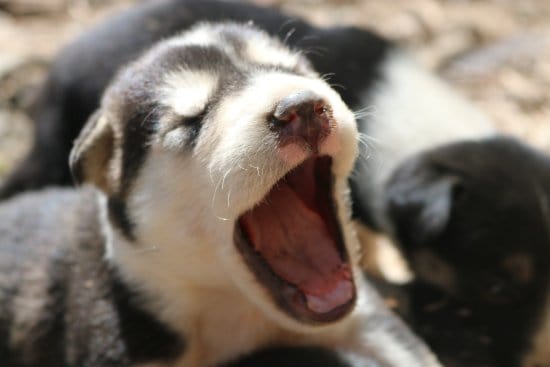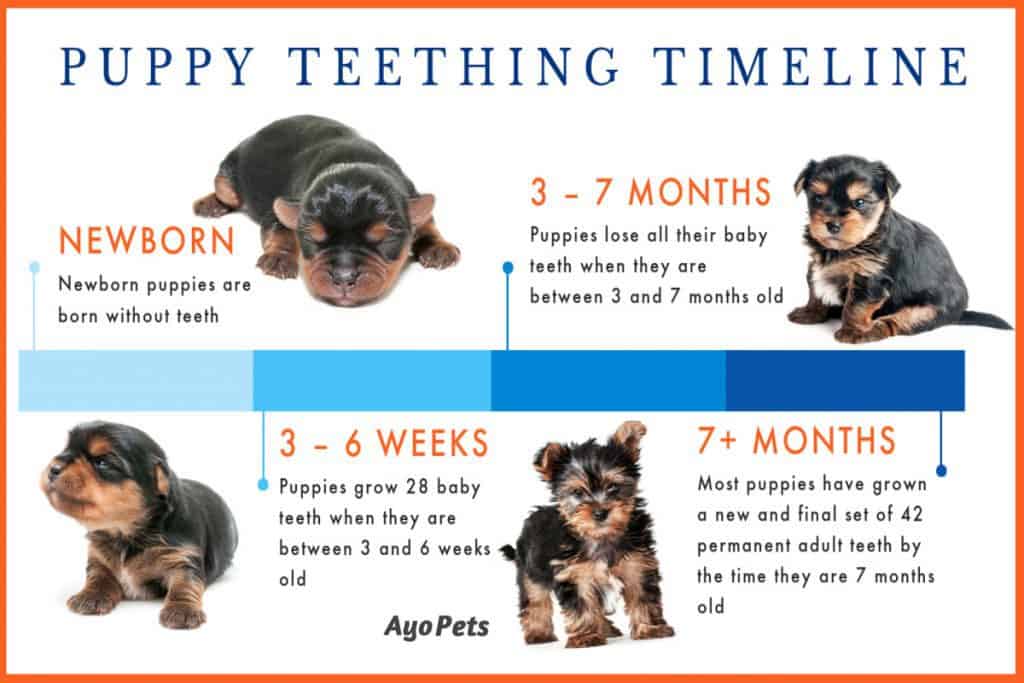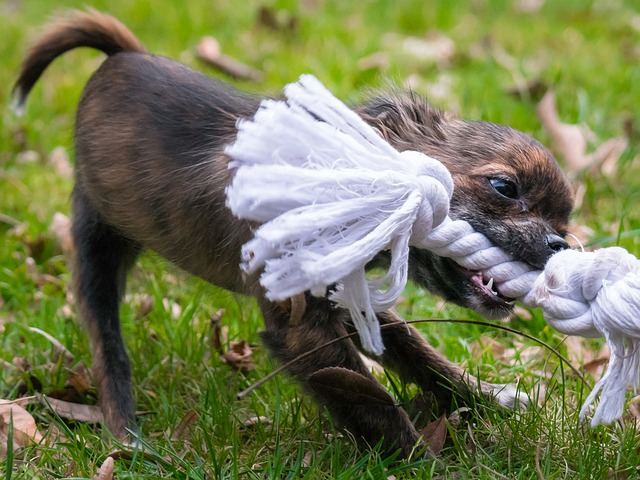Most dog owners asked, “Seriously, when will my puppy stop teething?” You might be wondering when your puppy will stop nibbling on everything if they are three or four months old, including their toys, your table, your shoes, and your hand. You probably already know that teething is a painful process for both parents and babies, but what about your furry children? Do puppies teethe like people? When do puppies begin to gnaw? How long does puppy teething last? What, if anything, can pet parents do to help their furry children get through it?
“Just like human babies, puppies go through teething. Others fuss, drool, and chew, while some breeze through it with no issues,” Debra M Eldredge, DVM, in upstate New York says.
The development of healthy teeth during puppy teething is essential for the health of your dog. Everything you need to know about your puppy’s teeth is provided here, from how to help them self-soothe (without ruining your favorite shoes) to when to call a veterinarian.
By the time they are a year old, puppies actually go through teething twice, according to Dr Eldredge says. She claims that the first teeth of newborn puppies start to erupt around two to three weeks of age.
And it won’t take much effort on your part to find them. The incisors, which are the tiny teeth in front, are the first to erupt, according to her. In total, puppies will develop 28 baby teeth (a. k. a. deciduous teeth, meaning they fall out).
Many pet parents never see a newborn dog teething because many puppies are adopted after weaning from their mother, which typically occurs at around 7 or 8 weeks old. Don’t worry: There’s another round of teething to come.
Do Puppies Swallow Their Baby Teeth?

You anticipate finding teeth everywhere when your puppy begins the dreaded teething phase. So when you don’t, it can be very concerning.
Nevertheless, if you notice that your pet is missing a few teeth, don’t go on the prowl and search your entire home. The adorable animal may have simply ingested the teeth.
Baby teeth typically start to erupt by the second month of your puppy’s life. Some begin to appear as early as one month, while others do so a little later. All of the deciduous teeth should be present by the second month.
Two months later, they should start to fall out. The process starts when the teeth become loose. Then they fall out as others take their place.
The incisors, your dog’s six front teeth that it uses to gnaw and groom itself, are the first to fall out. Next, as permanent canine teeth erupt to replace them, are the canine or fang teeth.
Puppies sometimes swallow their baby teeth unknowingly. Perhaps the puppy’s tooth fell out while it was eating and was swallowed along with the food Other times, the puppy’s teeth fall out while it’s engaged in chewing on a toy or a bone, deceiving it into believing it is a treat or something.
Well, if you know a thing or two about the anatomy of a dog’s body, you probably understand that the enamel is the toughest part of the dog’s body. It is the same case with human beings and other animals.
Water, collagen, and other substances make up the remaining 4% of the enamel’s 96% mineral composition. Dentin follows at a close second at 70% mineral. The upper portion of the tooth—the one that erupts—contains both of these tissues.
With this knowledge, it is natural to wonder what will happen to the tooth as it travels through the digestive system.
It will please you to know that swallowing your puppy’s own tooth is completely safe. Due to its extreme hardness, the tooth will simply pass through the throat, gut, large intestine, and anus. It is not digested in any way.
You can see the tooth after it has been expelled from the dog’s system if you pay close attention to your dog’s waste.
Although they are sharp, puppy teeth do not endanger the dog. There are no reports of them pricking the digestive tract’s walls or doing anything else. They safely pass through without bringing any harm.
Not all puppies swallow their baby teeth, though. Some will drop to the ground, while others will be ingested.
For the unlucky ones, the deciduous teeth will remain in place even as the adult teeth erupt—a situation called retained deciduous teeth. If you notice this, call the vet and let him remove the baby teeth early enough so that the baby teeth will grow properly.
When do puppies start losing their baby teeth?

When puppies are about three weeks old, they begin to develop their baby teeth, also known as deciduous teeth or milk teeth. Puppies typically have a full set of 28 baby teeth by the time they are six weeks old.
Puppies begin losing their baby teeth around three months old as part of the normal teething process, which typically concludes when they are six to seven months old. They ought to have a full set of 42 permanent adult teeth by then.
Like a human newborn, a puppy’s gums become sore and uncomfortable while they are teething. To relieve this discomfort and speed the eruption of the new teeth, the puppy will chew on objects.
Should You Pull Baby or Fang Teeth Out?

Your puppy may exhibit signs of distress and discomfort throughout the entire teething stage, which can last up to three months.
You’re in luck if he goes about his normal business of drinking, eating, interacting with people, and exploring.
Otherwise, you might want to give him a lot of teething toys to comfort his achy gums if he is uncomfortable or in pain.
When the fang teeth loosen, it is very tempting to want to pull them out. However, experts strongly warn against doing this.
This is due to the fact that dog teeth, like human teeth, have incredibly long roots. When a tooth is pulled, the root may break and remain in pieces, which could result in a severe infection.
However, if baby teeth are left behind, it will interfere with the eruption of the permanent teeth. This is known as retained deciduous teeth, which is when a permanent tooth emerges where a deciduous tooth was previously present.
When this occurs, the permanent tooth’s alignment is disrupted, leading to an issue known as a “bad bite” or occlusion problem.
To be safe, keep a close eye on your dog’s mouth while they are teething.
Granted, don’t remove the fang teeth, but if you see any retained baby teeth, call your veterinarian and have him remove them safely.
Related Posts:
FAQ
Can puppies choke teeth?
Treats for a puppy’s teething They may result in choking, intestinal blockages, or even death. If used in moderation, other products like rubber toys or chewing gum can be safe. However, they can also become problematic if your dog chews on them excessively or if they ingest toy or bone fragments.
Why do puppies try to eat their teeth?
Puppy chewing is motivated by the urge to investigate interesting objects and the discomfort of teething. Puppies go through a stage similar to human infants where they lose their baby teeth and feel pain as their adult teeth erupt. By six months of age, this phase of more intense chewing usually ends.
Do puppy teeth dissolve?
Yes, just like children, puppies lose their baby teeth on a regular basis. Puppies have 28 tiny, incisor-like puppy (deciduous) teeth, which start to emerge at around one month old and are all present by two months. The roots of the deciduous teeth start to resorb (dissolve) by 4 months.
How much does it cost to remove retained puppy teeth?
Simple extractions can cost between $10 and $15. (1) Depending on how difficult it is to remove a tooth, elevated extractions, which involve elevating each root, can cost up to $25 to $35 per tooth. Drilling multiple roots can cost up to $100 per tooth.
